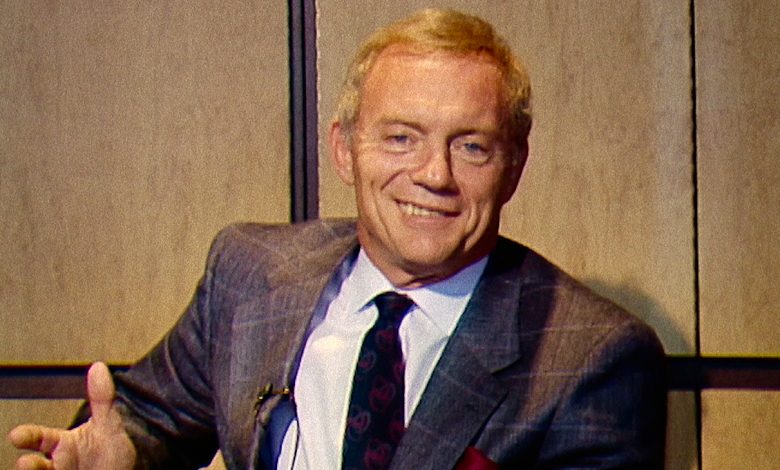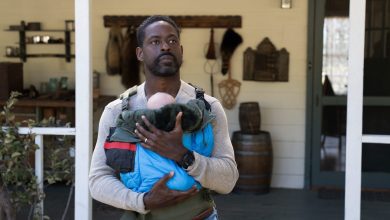‘America’s Team: The Gambler’ Directors Go Deep on Their Time With Jerry Jones, the “Willy Wonka of the NFL”

Eleven years ago, Netflix bet that brothers Chapman and Maclain Way, the nephews of actor Kurt Russell, could turn subscribers on to sports via their documentary The Battered Bastards of Baseball. Years later, the wager really paid off with the Way boys’ (Wild Wild Country) excellent and ongoing sports-documentary series, Untold. The gamble paled in comparison to the hand their newest subject, Dallas Cowboys owner Jerry Jones, went all-in on in the oil fields.
Jones, the 82-year-old business tycoon, whose portfolio has included ownership of the Cowboys since 1989, is as charismatic as ever in Netflix’s Aug. 19 release, America’s Team: The Gambler and His Cowboys, directed by the Way boys (music by third brother Brocker Way). How charismatic was he? Well, I really don’t like the Cowboys (go Giants!), and I really liked this docuseries.
The America’s Team release comes two months and a day after the premiere of America’s Sweethearts: Dallas Cowboys Cheerleaders, and exactly four months and a week before Netflix’s Christmas Day NFL slate kicks off with those Cowboys vs. Washington Commanders. (The cheerleader docuseries, essentially a higher-brow version of the long-running CMT reality show Dallas Cowboys Cheerleaders: Making the Team, hails from Greg Whiteley, another Mt. Rushmore Netflix sports docuseries director; America’s Sweethearts was renewed for a third season on Monday.)
America loves the Cowboys — perhaps America has bad taste. But why does Netflix?
“The Cowboys are more than a football team,” Gabe Spitzer, Netflix’s vice president of sports programming, told The Hollywood Reporter. “They’re a cultural phenomenon with storylines that transcend sports, with Jerry Jones and his family front and center.”
“We’ve always been fascinated with those iconic 1990s teams, all of which were a true nexus of success, intrigue, ambition and celebrity,” he added. “Whether they’re winning or losing, the Cowboys remain at the center of conversation, with a reach that extends far beyond the field.”
It is the “blend of drama, legacy and spectacle” that “makes the Cowboys a natural fit for Netflix’s approach to long-form, meaningful storytelling,” Spitzer said.
And that is right around where THR’s Q&A with the Way brothers picks up…
***
From your vantage point, what is sort of the arrangement between Netflix and the Cowboys right now?
MACLAIN WAY It’s a great question. If I’m guessing here, and I am a little bit, I just think that Jerry is a very easy business partner to have if you’re a media company. I don’t know any other NFL owner personally, but I would assume there are a lot of owners — not just in the NFL, but in all sports — that probably see a documentary series like this as more of a headache than it’s worth. And I don’t think it is. I think you can make a documentary series that captures, yes, some low lows. But we also would always tell these guys, ”We want to get our audience as close to what you guys felt when you guys won these Super Bowls.” Jerry just didn’t really need that explaining. There’s a little bit of a match made in heaven with Jerry Jones and the Dallas Cowboys that is great for a media company.
Jerry Jones is incredible in this. Were you surprised by how lucid and energetic and good a talker he (still) is?
CHAPMAN WAY It was a big surprise. The first time we met Jerry, I always feel like you’re trying to explain to your subjects, “Look, we’ve got to cover the good, the bad, the ugly — we’ve got to cover everything.” And Jerry talked to us for two hours about storytelling and about the Cowboys as a soap opera. He was telling us, “You need conflict, you need drama.” And I was like, “Oh my God, this is like a dream come true” as far as having a subject. Then after spending about a week with him, I realized, “Holy crap, Jerry Jones is kind of like the Willy Wonka of the NFL.”
There is a misconception about him as this overbearing person, but he’s actually incredibly sensitive. He’s kind of a dreamer. It’s very small, but you’ll notice, he doodles the whole interview. And it doesn’t really mean anything, but it’s part of his creative process. The man has a really unique, creative mind for what modern football is like, what his vision of this game was, how to market this team and how to build this team.

Michael Irvin in America’s Team.
Courtesy of Netflix
MACLAIN There are a couple things that stand out about interviewing Jerry, because we interviewed him at length. I remember finding out this pretty early, which I found interesting in our research — he would attend these Zig Ziglar salesmanship seminars — I think in the 50s, early 60s — which is like, “Think and grow rich, pull yourself up by your bootstraps” and “How to sell things.” I’ve never been in anything like that before, a salesmanship school of some kind. I think that that does in some way influence how you tell stories and how you sell a story, which Jerry is obviously very good at.
The other thing that was so unexpected was how emotional Jerry can get. Even the first time I met with him, he starts telling me a story about playing at the University of Arkansas, and it was not a story about winning the national championship, which we certainly cover in the documentary series. It was a story about how the coach told him that he was the most sensitive player on the entire team. Jerry’s response was, “You’re right. I feel more pain than other people feel, and I should be given more credit for that. I should be given a pat on the back because I feel more pain.” But as he’s telling me this story, tears are streaming down his face, so it’s an immediate, “Whoa.” You assume the things that you assume. This is a billionaire. He’s got all these billions of dollars. He’s the owner of the Dallas Cowboys. He’s such a public figure in the NFL. But my first time meeting with him, he’s a foot and a half away from me, telling the story intensely and intently, and tears are coming down his face. As a filmmaker, you’re like, “I’m interested in sitting across from this guy and having a really wide-ranging conversation with him,” and that’s really what we did.
Did Jerry need more breaks than your typical interview subject?
MACLAIN We almost always request the breaks on our side so that we can swap in new media cards for the cameras, so I actually don’t recall Jerry requesting to take a break himself. If he did, I think it was about the same as everyone else.
Who was the hardest interview to get?
MACLAIN Once we got them in the chair, everyone was incredibly open and super easy to work with, and gave us more time than we wanted. Of course, there’s a challenge to finding a day that works with them. Deion Sanders literally had to come in from Boulder, Colorado, practice, stay overnight, get up early and film for three hours. But he was like, “Do the longest interview I’ve ever done. I got afternoon practice.”
Deion was someone that was so fun to interview, because — and I’m not even criticizing Deion here — but when you zig, Deion zags a little bit. There’s an inherent contrarianism. You feel one way, he’s gonna maybe take the other way. But I love that as an interview, because it allowed Deion to show his personality. I read an old quote where Deion said, “Well, I was the ’It.’” And so I asked him, “Well, you said you were the ’It.’ What’s the ’It’?” He’s like, “The ’It’ is the reason, the season, the rhyme.” And he goes off. I was like, “This is the best interview I’ve ever seen.” It was so cool. Chap, who do you think?
CHAPMAN There’s been a lot of sensitivities between Jerry and Jimmy [Johnson]. I think it’s the reason why this hasn’t happened before. I think everyone’s like, “How has it not been in ’90s dynasty Cowboys doc?” I think it’s been very hard to get both of them in the same project. And I think a little bit of our job was convincing some people that look, “This is going to be kind of unique, because Netflix has final cut here. So, we’ve been brought on by Netflix to tell the story accurately and fairly, and it’s going to include multiple point of views.” It’s not just Jerry’s point of view, and Jerry understood that. Jerry not only understood it, but he kind of invited it. He wanted it. He wanted to hear the criticism, what people had to say about him. He wanted to hear Jimmy’s version. And even though they don’t always [agree], there’s for some reason, at this point in their lives, more of a mutual respect for what they had accomplished together. Getting Jimmy to sit down was a big component of really making this a definitive ’90s Cowboys documentary.
Were there any legal concerns about Michael Irvin speaking openly about some of the ‘90s behavior?
MACLAIN Like every documentary that we make, we do our own very thorough vetting process, like a defamation review from an experienced First Amendment attorney. And that’s not just for protection for people that are sitting in the chair. It’s protection for the documentary. It’s part of the process of getting errors and omissions insurance, just getting bonded, which is just a part of the filmmaking processes as you make something. But no, most of the stuff was definitely in the public eye. Michael had not really talked about something like Scissorgate, where he got into an argument with a former teammate (Everett McIver), and, you know, essentially stabbed [him] in the neck.
Michael was awesome. He was one of our favorite interviews, if not the favorite interview. We even felt obligated to include this — the [infamous Cowboys party house], “White House,“ is, for this story, this mythical thing. Even when I started doing research and talking to people, so many people would be like, “Are you gonna cover the White House… you’re gonna talk about the White House?” I was like, “OK, yeah, we’ll definitely figure out a way to get this in.” Easier said than done, because as soon as we started asking players about the White House, they would absolutely clam up. I remember asking Michael Irvin about the White House, it was a little bit like the rubber hits the road, and his first answer was, “Bro, I was the president of the White House.” And he launches in and tells it to us, and I think there’s something charming and empowering about that.
CHAPMAN Michael was one of those people that is so raw in vulnerability that you can’t help but respect it, but have admiration for it. He’s emotional. He’s honest about his own frailties. He’s a really deep, deep human and he’s just hilarious. There was at least a handful of times where we had to stop filming because we were laughing and… ruining the takes. We’re pretty well-trained at this point. Michael is just that super funny.
How did you get those old, crazy phone messages to the “White House”?
MACLAIN Those voicemails were [KXAS-TV]… the one that did the Tarnished Star report. We basically hit up all the local news archives and got them to digitize old tapes that hadn’t been seen since when they first aired — and they had tons of those voicemails. I also know that one of our talking heads, Dennis Pedini, had quite a large archive, but a lot of credit goes to our producers on that front to find all that stuff that was so fun.
CHAPMAN There’s very few times where we drop out music completely, and that was one of those moments when the voicemail from the brother who called Michael [Irvin]. We were like, “This deserves no music, and then we’ll bring the music back here.” That was a crazy moment.
***
America’s Team: The Gambler is now streaming on Netflix.
Source: Hollywoodreporter
HiCelebNews online magazine publishes interesting content every day in the TV section of the entertainment category. Follow us to read the latest news.
Related Posts
- ‘Fallout’ Season 2 Trailer Reveals New Vegas, Premiere Date and a Sinister Justin Theroux
- Michael Franti Departs Activist Artist Management Following Sexual Misconduct Allegations
- ‘Monsters: The Lyle and Erik Menendez Story’ Co-Creator Wants to See Brothers Paroled
- ‘Long Story Short’ Stars on Doing a Jewish Family Comedy in 2025: “There’s Going to Be Vitriol”
- Kevin Spacey Comeback Bid Continues With Appearance at Venice Film Festival





